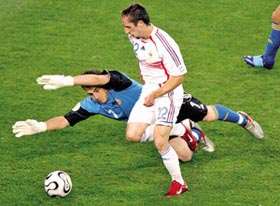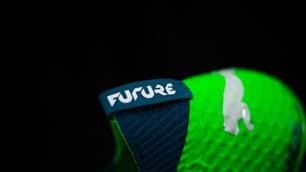10 to watch in 2007
Page 2 of 13 | Single page
A teenage Ribery managed to work his way to Third Division side Alès, only to witness the club go bankrupt. Brest, in the same division, noticed though, and hoicked him off to Brittany in 2003. If we were just three years from the World Cup, Ribery was light years away from thinking he might be involved. But his season at Brest was to be a turning point. With the most assists in his division, the winger caught the eye of one of French football’s most respected coaches, Jean Fernandez, then at Metz. Several times Fernandez drove from Metz, across the north of France, to one of the country’s most westerly points to watch Ribery at Brest. He ended up getting his man. Ribery was 21 when he signed for Metz, then in the top flight, and they were his fourth club, not counting Lille.
“When we signed Franck he was ever so shy, and was coming out of a really tough period in his life where there were a lot of problems to deal with,” says Fernandez. “But he already had the qualities that he’s showing today, the same dribbling skills and great acceleration. At Metz, he became the man with the most assists in the six months he was with us. Today of course he has more recognition because he’s at a bigger club with Marseille, but everything that’s happening to him is no surprise to me.”
Ribery proved to be an immediate hit at Metz, drawing comparisons with the club’s favourite son, Robert Pires. He was called into the France Under-21 side after some impressive displays, coping with the leap up two divisions with few qualms. But then Ribery showed his impetuous side, quitting Metz after half a season for the unlikely destination of Galatasaray. French fans were stunned. Six months on they were stunned again when Ribery, who had proved a big hit with Galatasaray, even scoring in their cup final victory over arch-rivals Fenerbahce, announced he was returning to France to join up again with Fernandez, now at Marseille. There followed a legal wrangle with the Turkish club, accused of not paying the Frenchman’s wages, and a bizarre public spat with a former agent, who reportedly turned up on Ribery’s doorstep in Boulogne armed with a baseball bat in a bid to resolve one or two little problems between the two men.
Still, Ribery was excited at the thought of playing in front of Marseille’s impassioned crowds of 60,000 at the Velodrome, where his idol Waddle had once strutted his stuff and where Jean-Pierre Papin, another of his heroes, had banged in so many spectacular goals. And he was overjoyed to be back with Fernandez.
“His presence was fundamental in my development, he was the one who came to get me when I was playing for Brest in the Third Division, literally picking me up in his car and driving me to the other side of France to convince me to join Metz,” relates Ribery. “He was the one who got me in the top flight and he contacted me as soon as he was appointed Marseille manager. Jean Fernandez represents the greatest encounter I’ve ever had in football. He’s my spiritual father and I think he considers me a little bit like a son. He’s the type of man you never forget, and he’s also one of the best coaches in France. And he’s even crazier about football than I am!”
Ribery quickly conquered the hearts and minds of France’s most demanding and passionate supporters with his whole-hearted performances, mazy runs, dribbling skills and sheer will to win. He was hogging the limelight with his displays and there was soon a campaign to catapult Ribery into the national set-up for the World Cup. Domenech resisted and resisted, only to end up naming him even though he’d never picked him before. The uncapped youngster was in, ahead of Ludovic Giuly, Johan Micoud, Nicolas Anelka and Pires.

Ribery, who’d watched the manager name the squad live on TV like us mere mortals, celebrated with a kickabout in his garden with his brother. When asked to explain his late inclusion, he summed it up perfectly: “I think people wanted to see me picked because I’m the kind of guy who never cheats. I give everything I have in my guts when I’m out there on the field and then of course there’s my background, my story. What’s happened to me shows that anything can happen in football, that you can come from a long way down the ladder to realise your dreams. I think people like that idea too. Nobody thought I could do it.”
Do it, though, he did, working his way from an impact substitute in the pre-World Cup friendlies to a starting place in the tournament. And, despite a few teething troubles, when the competition really got going Ribery showed he was ready. Having struggled through the group stage, France were up against a Spain team that was firing on all cylinders and, for once, favourites to beat the stuttering French. The Spanish went ahead, only for Ribery to strike his first goal for Les Bleus, running through the opposition’s backline before firing in the effort that lifted French chins and ultimately launched them on their run to the final. A star was born.
Like everybody else in the French camp, Thierry Henry was under the spell: "Franck always shows this will to go forward, the will to attack," Henry said. “There are very few players in the world today who can accelerate like he does, brutally. He plays with freedom and he can unlock a match at any moment. He plays with his heart.”
Post-World Cup Ribery was again involved in transfer shenanigans, claiming to have contacts with Arsenal, where he dreams of playing alongside his new buddy Henry, before announcing live on the nation’s most-watched evening news bulletin that he would be joining Lyon. Marseille, still regretting the departure of Didier Drogba to Chelsea, were having none of it and Ribery stayed.
The fans wanted to give him a hard time for his apparent lack of fidelity, but Ribery carried on as if nothing had happened, tormenting visiting defenders and running himself into the ground – so much so that the supporters soon found themselves cheering him on again. Ribery wins over fans because he is one of them in much of his attitude and behaviour. He has qualities they want to see: he’s a winner who will always try to take people on, and who isn’t afraid to turn on a show when possible.
“I play how I feel: I don’t have a set way of playing as I’m an instinctive type of player,” he says. “When I get the ball I don’t hang around to think about it, I get going, and I look to create as much danger as possible. My greatest strength is simply the fact that I love football so much. I’m an attacking midfielder, not a forward, but I can play up front, on the left or the right. I even ended up last season playing just behind the strikers. One thing for sure is I won’t change the way I play. I do what I know best. I’ve always been guided by pleasure, whether in Division Three or in the World Cup, and I don’t see why I should change.
“For me, football is full-time. I live and breathe it. And when I see my dad, who works in the building trade, get up at 7am every day and finish at six in the evening, I say to myself that footballers are lucky.
“Even if I lack experience I have youth and spirit on my side. Pressure has no effect on me, I never feel it, and as soon as I’m out there I want to be taking people on and setting up people, taking chances. Sometimes I improvise and try dribbles I never even imagined. I’m always looking to enjoy myself on the pitch, that’s what I love! You have to give people value for money, and it’s in my character to give my all, to try everything, to make my runs, to go past people, to dribble with the ball, the kind of stuff that gets people off their seats.”
Stewards around Europe, you have been warned. Next season, as the Frenchman flies down the wings, you’ll be telling a lot of people to sit down.
“When we signed Franck he was ever so shy, and was coming out of a really tough period in his life where there were a lot of problems to deal with,” says Fernandez. “But he already had the qualities that he’s showing today, the same dribbling skills and great acceleration. At Metz, he became the man with the most assists in the six months he was with us. Today of course he has more recognition because he’s at a bigger club with Marseille, but everything that’s happening to him is no surprise to me.”
Ribery proved to be an immediate hit at Metz, drawing comparisons with the club’s favourite son, Robert Pires. He was called into the France Under-21 side after some impressive displays, coping with the leap up two divisions with few qualms. But then Ribery showed his impetuous side, quitting Metz after half a season for the unlikely destination of Galatasaray. French fans were stunned. Six months on they were stunned again when Ribery, who had proved a big hit with Galatasaray, even scoring in their cup final victory over arch-rivals Fenerbahce, announced he was returning to France to join up again with Fernandez, now at Marseille. There followed a legal wrangle with the Turkish club, accused of not paying the Frenchman’s wages, and a bizarre public spat with a former agent, who reportedly turned up on Ribery’s doorstep in Boulogne armed with a baseball bat in a bid to resolve one or two little problems between the two men.
Still, Ribery was excited at the thought of playing in front of Marseille’s impassioned crowds of 60,000 at the Velodrome, where his idol Waddle had once strutted his stuff and where Jean-Pierre Papin, another of his heroes, had banged in so many spectacular goals. And he was overjoyed to be back with Fernandez.
“His presence was fundamental in my development, he was the one who came to get me when I was playing for Brest in the Third Division, literally picking me up in his car and driving me to the other side of France to convince me to join Metz,” relates Ribery. “He was the one who got me in the top flight and he contacted me as soon as he was appointed Marseille manager. Jean Fernandez represents the greatest encounter I’ve ever had in football. He’s my spiritual father and I think he considers me a little bit like a son. He’s the type of man you never forget, and he’s also one of the best coaches in France. And he’s even crazier about football than I am!”
Ribery quickly conquered the hearts and minds of France’s most demanding and passionate supporters with his whole-hearted performances, mazy runs, dribbling skills and sheer will to win. He was hogging the limelight with his displays and there was soon a campaign to catapult Ribery into the national set-up for the World Cup. Domenech resisted and resisted, only to end up naming him even though he’d never picked him before. The uncapped youngster was in, ahead of Ludovic Giuly, Johan Micoud, Nicolas Anelka and Pires.

Ribery, who’d watched the manager name the squad live on TV like us mere mortals, celebrated with a kickabout in his garden with his brother. When asked to explain his late inclusion, he summed it up perfectly: “I think people wanted to see me picked because I’m the kind of guy who never cheats. I give everything I have in my guts when I’m out there on the field and then of course there’s my background, my story. What’s happened to me shows that anything can happen in football, that you can come from a long way down the ladder to realise your dreams. I think people like that idea too. Nobody thought I could do it.”
Do it, though, he did, working his way from an impact substitute in the pre-World Cup friendlies to a starting place in the tournament. And, despite a few teething troubles, when the competition really got going Ribery showed he was ready. Having struggled through the group stage, France were up against a Spain team that was firing on all cylinders and, for once, favourites to beat the stuttering French. The Spanish went ahead, only for Ribery to strike his first goal for Les Bleus, running through the opposition’s backline before firing in the effort that lifted French chins and ultimately launched them on their run to the final. A star was born.
Like everybody else in the French camp, Thierry Henry was under the spell: "Franck always shows this will to go forward, the will to attack," Henry said. “There are very few players in the world today who can accelerate like he does, brutally. He plays with freedom and he can unlock a match at any moment. He plays with his heart.”
Post-World Cup Ribery was again involved in transfer shenanigans, claiming to have contacts with Arsenal, where he dreams of playing alongside his new buddy Henry, before announcing live on the nation’s most-watched evening news bulletin that he would be joining Lyon. Marseille, still regretting the departure of Didier Drogba to Chelsea, were having none of it and Ribery stayed.
The fans wanted to give him a hard time for his apparent lack of fidelity, but Ribery carried on as if nothing had happened, tormenting visiting defenders and running himself into the ground – so much so that the supporters soon found themselves cheering him on again. Ribery wins over fans because he is one of them in much of his attitude and behaviour. He has qualities they want to see: he’s a winner who will always try to take people on, and who isn’t afraid to turn on a show when possible.
“I play how I feel: I don’t have a set way of playing as I’m an instinctive type of player,” he says. “When I get the ball I don’t hang around to think about it, I get going, and I look to create as much danger as possible. My greatest strength is simply the fact that I love football so much. I’m an attacking midfielder, not a forward, but I can play up front, on the left or the right. I even ended up last season playing just behind the strikers. One thing for sure is I won’t change the way I play. I do what I know best. I’ve always been guided by pleasure, whether in Division Three or in the World Cup, and I don’t see why I should change.
“For me, football is full-time. I live and breathe it. And when I see my dad, who works in the building trade, get up at 7am every day and finish at six in the evening, I say to myself that footballers are lucky.
“Even if I lack experience I have youth and spirit on my side. Pressure has no effect on me, I never feel it, and as soon as I’m out there I want to be taking people on and setting up people, taking chances. Sometimes I improvise and try dribbles I never even imagined. I’m always looking to enjoy myself on the pitch, that’s what I love! You have to give people value for money, and it’s in my character to give my all, to try everything, to make my runs, to go past people, to dribble with the ball, the kind of stuff that gets people off their seats.”
Stewards around Europe, you have been warned. Next season, as the Frenchman flies down the wings, you’ll be telling a lot of people to sit down.
Related Articles

PUMA reveals new 'Stun Pack'

PUMA Future 18.1 up close













